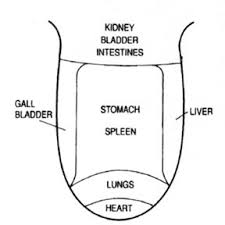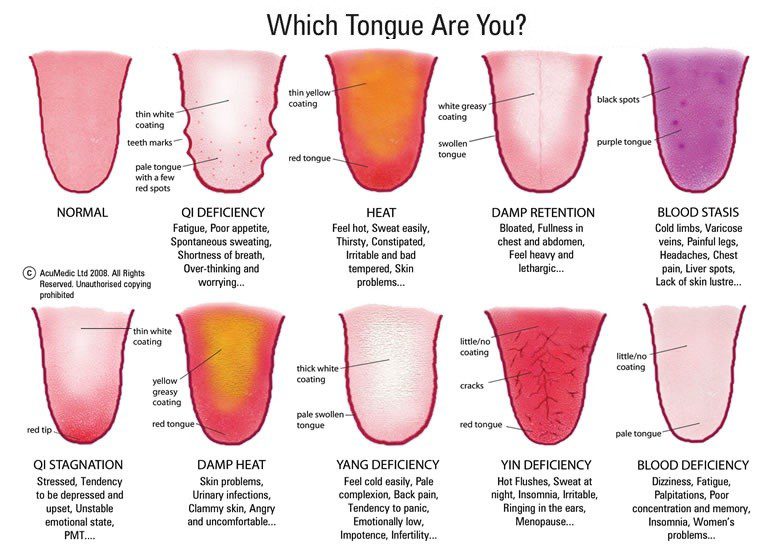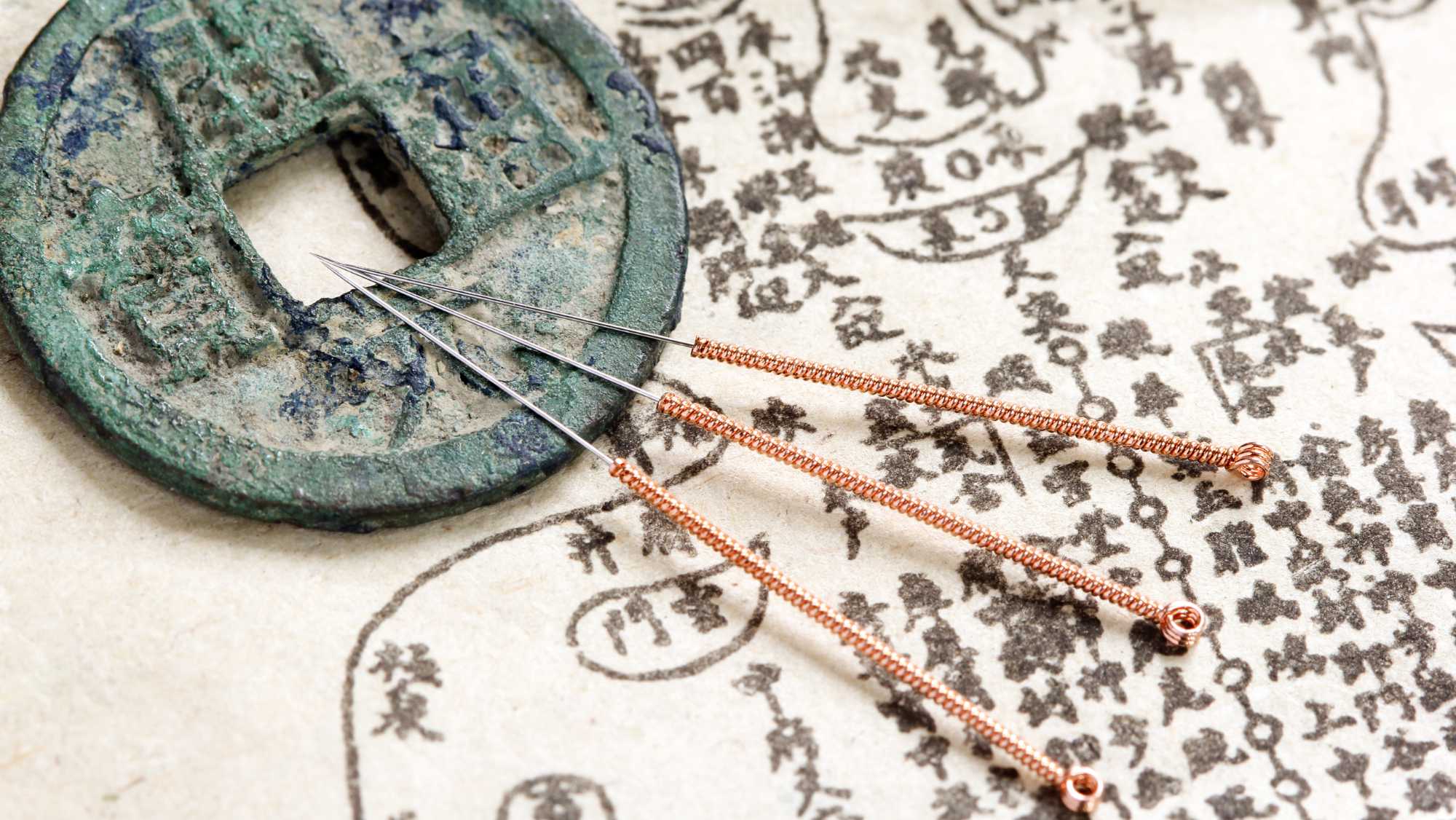As we discussed in our Secrets of Pulse Diagnosis post, tongue diagnosis is another primary method in Chinese Medicine for understanding what is happening inside the human body. It is the other “MRI” of traditional medical systems.
While tongue diagnosis can be used for acupuncture, it’s of particular importance for determining the proper diagnosis during your herbal medicine consult.
As with pulse diagnosis, there are general qualities of the tongue that show how the body is doing on a macro level, and specific qualities that zoom in on particular organ systems of the body.
What should your tongue look like?
In Chinese medicine, each type of tongue quality relates to a Chinese diagnosis, as well as particular physical and mental/emotional symptoms. These tongue qualities are described in more detail below.
What does the shape of your tongue mean?
- A swollen tongue indicates “qi deficiency.” If the tongue swells sufficiently, it will press against the teeth, creating teeth marks which is called a scalloped tongue
- A small or thin tongue can indicate either “blood deficiency” or “yin deficiency.”
What color should your tongue be?
- The tongue body color indicates the body’s internal temperature. A normal tongue color shows up as light red or pink.
- A pale tongue indicates a “cold” condition.
- A red tongue indicates a “heat” condition.
- A purple tongue indicates “blood stagnation,” or insufficient blood circulation.
What is that coating on my tongue?
- The coating on the tongue primarily reflects the coating and lining of the digestive system. A normal tongue has a thin white coat, which reflects a healthy lining of the digestive system and normal gut flora.
- A thick tongue coat indicates that digestion is sluggish.
- A thick white coat points to an issue of “cold” in the GI tract
- A thick yellow coat indicates “heat” or inflammation in the GI tract.
- A peeled or cracked tongue coat indicates insufficient lining or flora in the digestive system.
Why does my tongue have a white coating?
According to Chinese Medicine, the coating on your tongue reflects the quality of your digestive system’s lining. The ideal is to have a thin white coat on your tongue. This indicates a healthy gut flora and normal levels of lining in the gut. Sluggish digestion appears as a thick tongue coat. If that thick tongue coating is white, this reflects a “cold” condition in the gut and digestive system. If the tongue coating is thick and yellow, it indicates a condition “heat” or inflammation in the GI tract.
The tongue’s relationship to the internal organs
Over time, Chinese medicine has observed that certain parts of the tongue relate to certain parts of the body.

Putting it all together
We can get a more complete picture of what’s happening inside your body when we put together the Tongue Qualities with the Internal Organs map. Review the tongue diagnosis chart below to see some of the most typical examples.

An example of tongue diagnosis
One of the benefits of tongue diagnosis is the ability to help us make a differential diagnosis, which identifies the cause of a particular symptom. For example, if someone has low back pain, that pain could be caused by a number of different factors. Differential diagnosis identifies which factor(s) are most likely causing the pain.
To elaborate, let’s say a patient has low back pain. The acupuncturist observes the tongue, and asks a few questions about what’s happening:
- If the low back pain is sharp, tense and knotted, and the tongue is red with some purple coloration, it’s a case of “heat” and “blood stagnation,” which means that the pain may be caused by obstructed blood flow and local inflammation.
- If the low back pain is dull, the back feels weak and very cold, and the patient feels generally drained and tired, and the tongue is pale, swollen and has a thick white coat it’s a case of “yang deficiency,” which means that there is not enough internal warmth to heat the muscles and support proper circulation to the lower back.
Depending on the differential diagnosis, the acupuncturist will then select the appropriate acupuncture points, herbal medicine formulas, and dietary and lifestyle recommendations.
Tongue Diagnosis, Stress, and the Body-Mind Connection
The tongue can be a great tool for better understanding the connection between body, mind, and lifestyle behaviors. For our herbalists, the tongue helps us select the proper herbal formula. To see how this works, let’s take a look at two cases of stress that commonly show up at the clinic:
- If someone is stressed, and the tongue is red and slightly purplish, especially in the Liver position (refer to graphic above), the acupuncturist would then ask the patient the following questions:
- Do you typically experience your stress as anger, irritation and frustration frequently or easily?
- When stressed, do you get headaches?
- Does your stress tend to collect in your upper back, shoulders and neck?
- Do you tend to feel a lot more relaxed, happy and energized after exercise, and/or after a couple drinks?
These symptoms are all related to “heat” and “blood stagnation” in the Liver and Liver meridian. A classic herbal remedy for this problem is Modified Free and Easy Wanderer Formula (Jia Wei Xiao Yao San).
- If someone is stressed, and the tongue is swollen and scalloped, and pale color, especially in the Spleen/Stomach position, the acupuncturist would then ask the patient the following questions:
- Do you worry a lot, or have obsessive or ruminating thoughts?
- When stressed, do you get stomach issues?
- Does your stress tend to collect in your stomach and abdomen?
- Do you tend to feel even more tired after exercise, and sleepy and foggy headed after a couple drinks?
These symptoms are all related to “qi deficiency” and “cold” in the Spleen/Stomach organs and meridians. A classic herbal remedy for this problem is Four Gentlemen Formula (Si Jun Zi Tang).
Tongue diagnosis at our clinic
Chinese medicine came up with ingenious ways of understanding what is going on inside of the body. Tongue diagnosis is one of those ways. By observing the tongue’s shape, size, coating and color, they could glean information about what body systems are the cause of dis-ease, what kind of imbalance is causing the health issue, and more. Tongue diagnosis is particularly powerful when combined with other clues offered by pulse diagnosis and a thorough discussion of symptoms.
Pulse and tongue diagnosis is often a part of the first acupuncture appointment at our practice, and it is always part of our herbal consultations.







